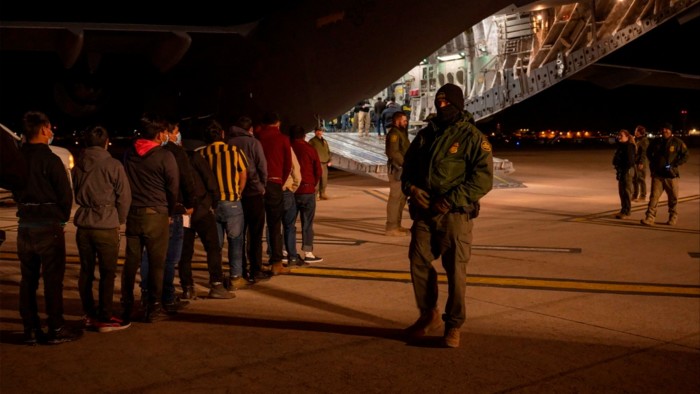Donald Trump unleashed a flurry of retaliatory measures against Colombia, including 25 per cent tariffs on its goods, after the Latin American country declined entry to US military flights deporting migrants.
Trump lashed out after Colombia’s left-wing President Gustavo Petro refused to receive the US aircraft in protest against the way the passengers on board were being treated.
Trump said in a post on Truth Social on Sunday that Petro’s move had “jeopardized the National Security and Public Safety of the United States”.
In retaliation, he announced emergency 25 per cent tariffs which would increase to 50 per cent in a week, alongside a travel ban and “immediate visa revocations” on Colombian government officials “and all allies and supporters”.
He also announced enhanced border inspections of all Colombian nationals and cargo.
“These measures are just the beginning,” Trump wrote in a post on Truth Social. “We will not allow the Colombian Government to violate its legal obligations with regard to the acceptance and return of the Criminals they forced into the United States!”
Petro had earlier written in a post on X that the deported migrants should be treated with “dignity and respect”.
“We will receive our fellow citizens on civilian planes, without treating them like criminals.”
Colombia has already turned away US military aircraft carrying deportees this week, Petro said on Sunday. A US official told Reuters that two flights carrying a total of 160 deportees had been refused entry.
“Colombia sends almost a third of its exports to the US so this emergency tariff and the threat to raise it further is serious,” said Will Freeman, a fellow for Latin American studies at the Council on Foreign Relations.
“It shows that wherever the Trump administration identifies the US still has leverage, it’s going to use it to the fullest to get compliance with its mass deportation policy.”
Trump has promised to carry out the largest mass deportation of illegal migrants in US history, prompting uncertainty among the estimated 11mn undocumented immigrants in the US and resistance from would-be partners in the region.
Petro’s announcement came a day after the Brazilian government condemned as “degrading” the use of handcuffs on its nationals aboard a deportation flight from the US.
After the plane made an unscheduled stop at Manaus on Friday due to technical problems, Brasília said it prevented the flight from continuing to the destination of Belo Horizonte because of the cuffs, the “poor condition” of the aircraft and the “anger” of the 88 Brazilian citizens over their “undignified treatment”.
Brazil’s justice minister said there had been “flagrant disrespect for the fundamental rights of Brazilian citizens” and its foreign ministry vowed to demand clarification from US officials.
For Brazil, a country with a long history of slavery, the use of cuffs to shackle its citizens is particularly sensitive.

Though Colombia and the US have long been close allies — with Washington providing around $10bn in military and foreign aid to Bogotá as part of its Plan Colombia aimed at fighting insurgents and drug traffickers between 1999 and 2016 — Trump and Petro are ideologically opposed.
In 2020, Trump referred to Petro, a leftist former guerrilla, as “a major loser”. Petro has spoken out strongly against the US-led war on drugs, and cocaine production in Colombia has soared under his presidency.
In another post on X on Sunday, Petro called for “an extraordinary meeting of Latin American presidents to examine the problems of migration and the new configuration of the drug market in America”.
“It’s important for Petro and a lot of Latin American leaders to show resistance to this policy on migration,” said Sergio Guzmán, director of Colombia Risk Analysis, a Bogotá-based consultancy. “Petro is trying to show force and to project an ideological difference with Trump.”
The flow of migrants north through the Darién Gap, a treacherous stretch of jungle that separates Colombia and Panama, has dropped in the past year, as has the number of illegal crossings into the US.
Last year, 302,000 migrants crossed the Darién Gap, down over 40 per cent on 2023, according to Panama’s foreign ministry, following a crackdown by Panamanian authorities on the route which is controlled by criminal smuggling groups.
Venezuelans, fleeing repression and economic collapse, made up the bulk of the crossings, with nearly 210,000 migrants, followed by 17,500 Colombians.
But many migrants used legal pathways opened by the Biden administration to cross into the US, and the overall migrant numbers are still near recent record highs.
Mexico is negotiating with the US over immigration and drugs to try to avoid a 25 per cent tariff on its exports to the US from next week.
Mexico‘s foreign ministry said on Friday that it would always welcome Mexicans back with open arms, after NBC News reported that it had refused to take back a military flight of migrants.
Mexican president Claudia Sheinbaum has stressed that while she does not agree with the deportations, Mexico will co-operate with the US and have a “good” relationship with the Trump administration.
Tom Homan, Trump’s border tsar, told ABC news on Sunday that if host countries refuse to receive migrants, “then we’ll place ‘em in a third safe country”.
The US Department of Homeland Security and the Customs and Border Protection agency did not respond to request for comment on the deportation flights.
Read the full article here




